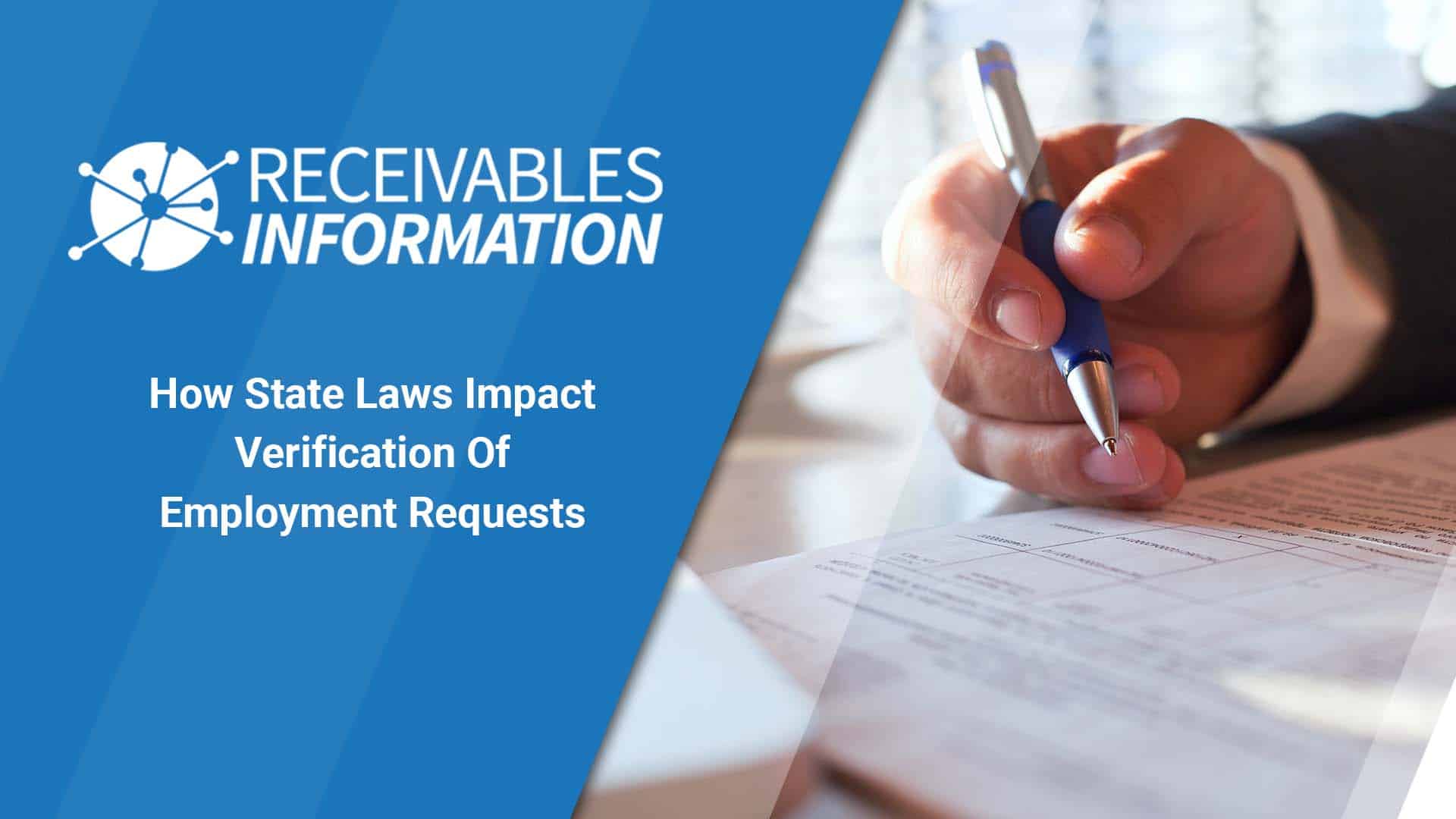
How State Laws Impact Verification Of Employment Requests
Verification or Proof of Employment (VoE) requests are one of the most common ways that third-party debt collectors will try to secure information on both the whereabouts and the employment status of consumers that owe sums of money. This process, which is defined in the Fair Debt Collection Practices Act (FDCPA), has changed slightly over the years due to two major state-level additions by California and New York.
At the federal level, the FDCPA regulates the companies that are collecting on your debt. Third-party companies that have bought your debt and are looking to collect may only contact you or your employer between the hours of 8 a.m. and 9 p.m. local time. However, a Verification or Proof of Employment request can be sent once to your employer and most likely will be answered by your place of employment.
In this verification request, your employer can be asked the following:
- Verify your employment status
- Get your location information
- Find out whether or not you have medical insurance if your debt is medically related
However, there is no legal repercussion should your employer not respond to the request and under the FDCPA only one request can be made to your employer for this information.
The Rosenthal Act
The largest state-level change to the FDCPA, named the Rosenthal Act in California, was introduced in 2003. The Rosenthal Act added original creditors to the list of those who have to abide by the FDCPA.
The FDCPA defines debt collectors as any person who regularly collects, or attempts to collect, consumer debts but this definition does not include the original creditors of your debt. Before the Rosenthal Act and at the federal level, original creditors – credit card companies, hospitals, and other major lenders – were allowed to ignore the FDCPA guidelines for debt collection.
When it comes to VoE or PoE requests, the Rosenthal Act did little to change how the process works but reinforced that any debt collector – original creditor or not – must abide by the rule that no debt information can be given out.
New York Changes
New York’s version of the FDCPA, called the New York Fair Debt Collection Practices Act, mirrors the federal FDCPA almost exactly and was designed to reinforce the original bill to cover any state statutes. Most notably, New York City protects consumers via the New York City Consumer Protection Law which includes additional requirements for debt collectors operating within NYC limits. These two laws together have influenced how debt collectors may contact consumers in the city and the state.
The New York statute gives consumers an additional security blanket as it passes the legal ramifications onto the state attorney general, rather than the consumer. If a violation is noted, the attorney general’s office will pursue the case rather than a consumer having to go through civil court.
The New York law does little to change how VoE’s work, but it does provide a direct portal for consumers looking to file a complaint about unfair debt collection practices. If a consumer believes their rights were violated under the FDCPA, they have recourse first under their own state law and then federally to correct the issue.
Wage Garnishment
The last piece of VoE’s comes only after a court order. In some extreme cases, a consumer can be court-ordered to pay his or her debts. This is called a judgment. A judgment gives the collector many different legal avenues to collect on the debt including repossession of assets or wage garnishment.
Wage garnishments are a court-ordered process in which a percentage of your wage is withheld by your employer and sent directly to the creditors to pay off your debts. Because this is a legally mandated process, when a verification of employment request comes to your employer with a court-ordered garnishment or judgment attached, your employer must respond to the request with all information requested.
Learn More
Understanding how or when a debt collection agency can contact you is tricky, but Receivables Info’s Money Chat series has an in-depth look at the FDCPA and what every consumer should know.
For more information on how debt is moved throughout the industry or what you should do once this process begins, visit RI’s Money Chat on “Why Is My Account Not With My Original Creditor?” and “4 Things To Keep In Mind When Talking To A Debt Collector.”
Looking for more ways to stay financially literate? Follow Receivables Info on Facebook, LinkedIn, and YouTube for daily updates on everything related to the Accounts Receivable Management industry and how to stay afloat through the debt collection process.
The information contained in this article is meant to serve as general guidance for entry-level to mid-level ARM industry professionals and is not meant to serve as comprehensive business, legal, or financial advice.





